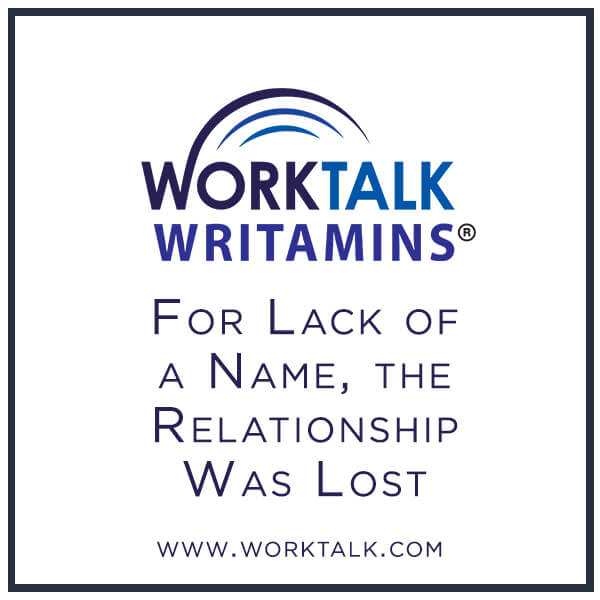
Arianne, a staff scientist at a regional utility, said she got an email from her manager that made her feel alienated. “Was it the content or tone of the email?” I asked. “Neither,” she replied, “He didn’t capitalize my name.” Arianne confided that she did not give her full commitment to reading the email when she saw that the manager had not bothered to capitalize her name.
Ed, a senior manager at a prestigious accounting firm, was writing to a prospective client. This client had been working with another well-known firm for many years and had approached Ed’s firm to ask for a proposal. I asked him why the client was considering leaving its old firm. He said that the other firm had misspelled the client’s name. Perhaps there were other issues, but the name spelling stuck in the client’s mind.
Suzanne, a management consultant, created a nine-page report for a business owner, detailing plans for turning around his business. She was trying to go through the report, but the client kept returning to the first page. Finally, she asked if there was a problem. “Yes,” said the client, “I live on Tanamara Lane. This says Tanamara Road.”
Are These People Sissies?
You might say that all the people in the stories above were oversensitive sissies who failed to see the big picture of the writer’s message. Maybe that’s true. But they vote. They vote with whether they engage at work, where they take their business, and whether they buy in to proposals. That’s a scary thought, isn’t it?
Because it means that the quick email we tap out as the flight attendant glares at us on an airplane, the email we write to a client at 10 pm when we’ve been up since early morning and aren’t thinking clearly, the cover letter we don’t bother to proofread – all these documents count. They affect our relationships with other people. What may seem to you like a trivial capital letter or an insignificant street name is actually more: In many readers’ minds, those words reflect your relationship.
Whether we are communicating on the phone, in email, in text, or in person, our lives consist of relationships. We build our relationships with other people action by action, choice by choice, and word by word. When the words are misspelled or uncapitalized, these are not just proofreading errors. They are relationship gaffes.
How can we use our words to build relationships?
- Doublecheck all names and addresses on emails and paper mail.
- As we saw above, people are persnickety when it comes to their names and addresses. You cannot afford to make a mistake here. Even if the person has a long, foreign-sounding name, remember that it doesn’t sound foreign to them: It’s their name! Spell it right.
- Re-read everything you write, imagining your reader as you do so.
- We all tend to keep our own virtual-reality helmets on: We see the world from our own point of view. When you re-read, put on your reader’s VR helmet. How will these words look to him or her? How will the tone come across? Will the language seem clear or will it be opaque or snooty? Everything gets better when we re-read and re-write.
- Be authentic.
- As Oscar Wilde said, “Be yourself. Everyone else is already taken.” The writing flows more easily when we’re not trying to put on a façade. When people use stodgy, formal language, they are usually hiding out. Obviously, we need to stay professional; we cannot lapse into excessive slang or informality. But writing from the heart helps.
Touching Minds and Hearts
Words are more than letters on a page or on a screen: They are pathways into the mind and heart of another person. When you realize this, you may take more care over “little things” like the spelling of a name or a detail on an address. When you are touching minds and hearts, details matter.

©2019 Elizabeth Danziger All rights reserved
BOOK YOUR STRATEGY CALL NOW Communication woes drag down productivity and morale. Book your free 30-minute “communications audit” consultation with Elizabeth Danziger. She will listen to your situation and suggest ways to improve communication in your organization right away. Contact her at lizd@worktalk.com or 310.396.8303. You can also book through www.calendly.com/worktalk.
~~~~~~~~~~~~~~~~~~~~~~~~~~~~~~~~~~~~~~~~~~~~~~~~~~~~~~~~~~~~~
Gain clarity today. Contact Elizabeth Danziger at lizd@worktalk.com or Emma Fialkoff at upworktalk@gmail.com to learn how you can generate better business through better writing.
Read Writamins on these topics:
Emailing Effectively
Writing Well
Choosing the Right Word
Thoughts on Writing
Writing Within Organizations
